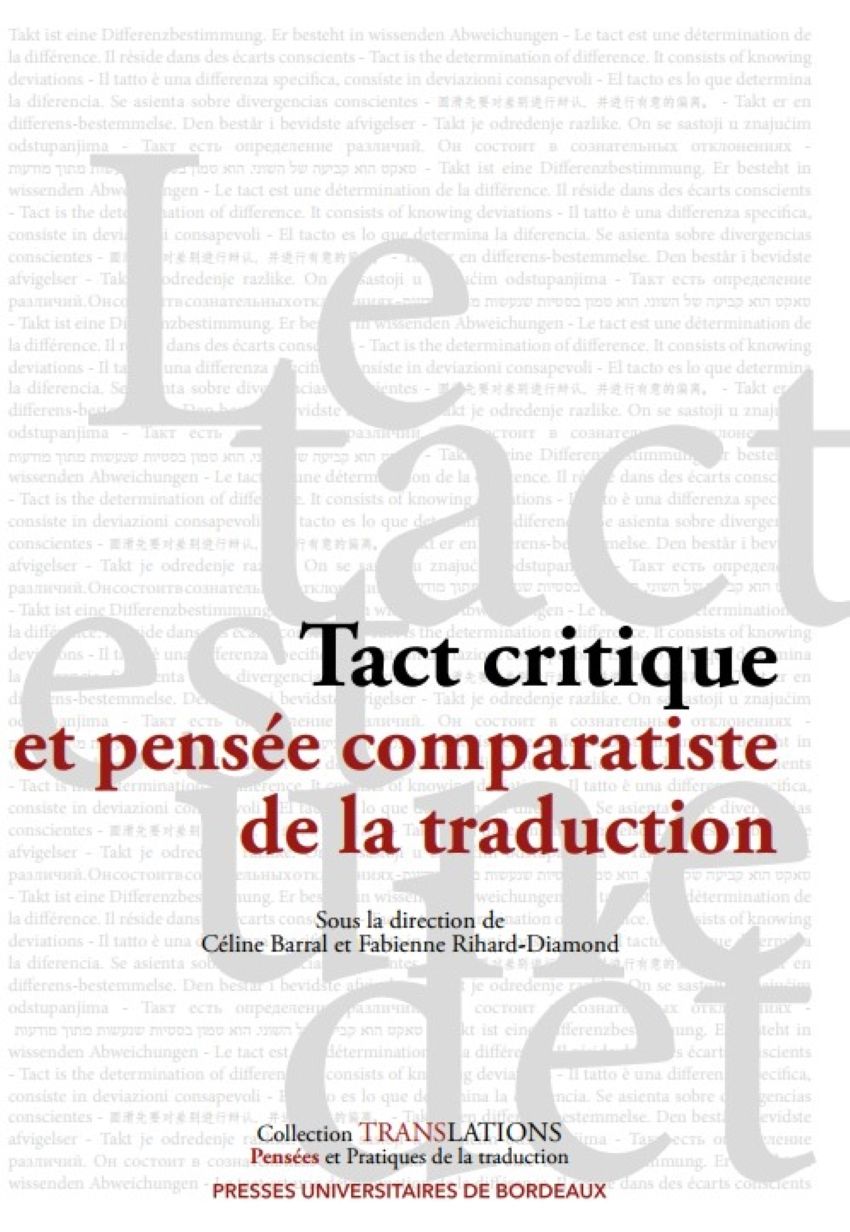
(English below)
Un livre choral qui déplie les sens et les mises en œuvre du tact dans les recherches littéraires comparatistes, à l’échelle mondiale.
Quatrième de couverture :
Réunissant pour les faire dialoguer les gestes critiques de chercheurs d’âges et d’horizons variés, cet ouvrage invite à réfléchir aux enjeux intellectuels, éthiques et politiques des études littéraires, et plus précisément, d’études littéraires comparatistes pratiquées à l’échelle du monde, tout en restant fermement ancrées dans le détail singulier des textes et des langues. Les contributeurs illustrent comment le comparatisme actuel fait vivre la mondialité du plurilinguisme et des circulations artistiques, qu’écrasent souvent les enjeux symboliques et économiques qui se jouent dans l’édition, la traduction et la réception des œuvres. Le comparatisme nécessite un tact critique, si l’on retient cette notion de « tact », historicisée ici avec soin, qui fait le lien entre la pratique et la théorie, la culture et le dilettantisme, le propre et l’autre, la convenance et la liberté des associations. Cette notion met aussi en jeu l’engagement relationnel entre enseignants et étudiants, auteurs et lecteurs, auteurs, éditeurs et traducteurs.
Sommaire :
INTRODUCTION
Le geste comparatiste comme pensée de la traduction et tact critique
Céline Barral et Fabienne Rihard-Diamond
CHAPITRE I - TRADUCTION ET TRANSMISSION : UNE AFFAIRE DE TACT ?
Enseigner (avec) la Bible dans le secondaire public français : sur quelques usages du tact comparatiste
Claire Placial
La langue confisquée : le statut de la traduction (Luther, Novalis, Hofmannsthal) et la quête de l’identité allemande
Vérane Partensky
CHAPITRE II - TACT ET HÉTÉROLINGUISME
« Like a thing unspoken but heard » : Conrad et le « tact » du romancier plurilingue – Écarts de langues et anti-impérialisme dans Lord Jim
Fabienne Rihard-Diamond
Hétérolinguismes critiques et enjeux de traduction dans Ova Completa (1987) de Susana Thénon
Blanche Turck
CHAPITRE III - TACT ET EXTRATERRITORIALITÉ
Toucher l’extrême altérité : déplacements dans l’espace de la lecture de Mahmoud Darwich
Ève de Dampierre-Noiray
L’adieu aux arbres : trouver une langue face à la violence de l’histoire – Étude d’une scène matrice dans les œuvres de Vladimir Nabokov, Aharon Appelfeld et Pierre Bergounioux
Isabelle Poulin
CHAPITRE IV - TACT, RÉCEPTION ET TRADUCTION
« Males and females but without the pricks or cunts » : le « tact » critique du traducteur face à la présence transgressive du corps dans If I Forget Thee, Jerusalem de William Faulkner
Térence Isart
Le tact intertextuel de l’écrivain à l’épreuve des traductions et stratégies éditoriales : L’exemple de Frankenstein à Bagdad d’Ahmed Saadawi
Bouamrane Derrar-Meftah
Tact diplomatique, tact traductif et tact littéraire dans Le Pont aux trois arches (1978) d’Ismail Kadaré et la version de son traducteur Jusuf Vrioni
Dea Jazexhi
Tact traductif et compositionnel : autour de la traduction du « Misanthrope » de Lu Xun par Heiner Müller dans Kopien 1 (1989)
Céline Barral
Présentation des auteurs
—
Critical Tact and The Awareness of the Translation Process in Comparative Literature
Bringing together the critical approaches of professors and students with very diverse horizons, this volume probes the intellectual, ethical and political stakes of literary studies, and more precisely, of comparative literature studies of a world-wide scope, but firmly anchored in the subtle particulars of singular texts and languages. The contributors exemplify how current comparative studies bring to light worldwide plurilingualism and artistic circulations, which are often erased by the symbolic and economic constraints of the publication, translation and reception of literary works. Comparative literature studies require critical tact : this volume carefully historicizes this notion, which binds together theory and practice, culture and dilettantism, the self and the other, the appropriateness and the freedom of associations. Critical tact also brings into play the quality of the relationship between students and teachers, between readers and writers, between writers, publishers, and translators.
Contents
Introduction : Comparative Literature as a Distinctive Awareness of the Translation Process and as Critical Tact (Céline Barral and Fabienne Rihard-Diamond)
Part I – Translation and Transmission : a Question of Tact
Teaching (with) the Bible in the Public French Secondary School System : About Several Uses of Comparative Critical Tact (Claire Placial)
The Confiscated Language : the Status of Translation (Luther, Novalis, Hofmannnsthal) and the Quest for German Identity (Vérane Partensky)
Part II – Tact and Heterolingualism
« Like a thing unspoken but heard » : Conrad and the Tact of the Plurilingual Novelist. Linguistic Gaps and Anti-Imperialism in Lord Jim (Fabienne Rihard-Diamond)
Critical Heterolingualism and Translation Issues in Susana Thénon’s Ova Completa (Blanche Turck)
Part III – Tact and Extraterritoriality
Touching the Extreme Otherness : Linguistic and Cultural Displacements in the Reading of Mahmoud Darwich’s Poems (Ève de Dampierre-Noiray)
A Farewell to Trees : Finding a Language to Confront Historical Violence. Study of a Matrix Scene in the Works of Vladimir Nabokov, Aharon Appelfeld and Pierre Bergounioux (Isabelle Poulin)
Part IV – Tact, Reception and Translation
« Males and females but without the pricks or cunts » : the Critical Tact of the Translator Facing the Transgressive Presence of the Body in William Faulkner’s If I Forget Thee, Jerusalem (Térence Isart)
The Writer’s Intertextual Tact Put to the Test of Translation and Publishing Strategies : the Example of Ahmed Saadawi’s Frankishtayn Fi Baghdad (Bouamrane Derrar-Meftah)
Diplomatic, Translative and Literary Tact in Ismail Kadaré’s The Three-Arched Bridge and its translation by Jusuf Vrioni (Dea Jazexhi)
Tact as Translation and Composition : about the Translation of Lu Xun’s « Misanthrope » by Heiner Müller in Kopien 1 (Céline Barral)